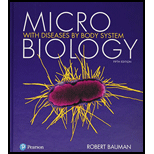
Microbiology with Diseases by Body System (5th Edition)
5th Edition
ISBN: 9780134477206
Author: Robert W. Bauman Ph.D.
Publisher: PEARSON
expand_more
expand_more
format_list_bulleted
Concept explainers
Question
Chapter 12, Problem 4CT
Summary Introduction
To answer:
Distinguish between filamentous
Introduction:
Fungi are unicellular/ multicellular or multinucleate organisms having filamentous structures called hyphae. Fungi are eukaryotes with the heterotrophic mode of nutrition. Vegetative growth of fungi takes place with the help of hyphae. Algae are unicellular to multicellular prokaryotic organisms. Mode of nutrition in algae is autotrophs but some of the green algae, brown algae (dinoflagellates) have become heterotrophs (colorless algae). Algae and fungi have a cell wall containing cellulose and chitin as their characteristic structures.
Expert Solution & Answer
Trending nowThis is a popular solution!

Students have asked these similar questions
What is the difference between Uniporters, Symporters and Antiporters? Which of these are examples of active transport?
What are coupled transporters?
What are “domains” and how do they aid in protein function?
Chapter 12 Solutions
Microbiology with Diseases by Body System (5th Edition)
Ch. 12 - Why is it incorrect to call mitosis cell division?Ch. 12 - Why did early taxonomists categorize such...Ch. 12 - Prob. 1EDCSCh. 12 - Prob. 3TMWCh. 12 - Why arent there large numbers of pathogenic algae?Ch. 12 - Prob. 5TMWCh. 12 - Prob. 6TMWCh. 12 - Haploid nuclei _________. a. contain one set of...Ch. 12 - Prob. 2MCCh. 12 - Which of the following statements accurately...
Ch. 12 - Prob. 4MCCh. 12 - Prob. 5MCCh. 12 - Prob. 6MCCh. 12 - A phycologist studies which of the following? a....Ch. 12 - The stemlike portion of a seaweed is called its...Ch. 12 - Carrageenan is found in the cell walls of which...Ch. 12 - Prob. 10MCCh. 12 - Which of the following features characterizes...Ch. 12 - Amoebas include microbes with ________. a....Ch. 12 - The motile feeding stage of a protozoan is called...Ch. 12 - Prob. 14MCCh. 12 - Prob. 15MCCh. 12 - 1. ___ Mitosis 2. ___ Meiosis 3. __ Homologous...Ch. 12 - Prob. 2MCh. 12 - Match each of the following descriptions with the...Ch. 12 - Prob. 1VICh. 12 - Prob. 2VICh. 12 - Prob. 1SACh. 12 - Prob. 2SACh. 12 - Prob. 3SACh. 12 - What are the taxonomic challenges in classifying...Ch. 12 - List several economic benefits of algae.Ch. 12 - Why are relatively large animals such as parasitic...Ch. 12 - Prob. 7SACh. 12 - What is the role of rRNA sequencing in the...Ch. 12 - Prob. 9SACh. 12 - The study of protozoa is called ________.Ch. 12 - Prob. 2FIBCh. 12 - Prob. 3FIBCh. 12 - Prob. 4FIBCh. 12 - Prob. 5FIBCh. 12 - How are cysts of protozoa similar to bacterial...Ch. 12 - Prob. 2CTCh. 12 - Why doesnt penicillin act against any of the...Ch. 12 - Prob. 4CTCh. 12 - Prob. 5CTCh. 12 - Prob. 6CTCh. 12 - Which metabolic pathways are present in protozoa...Ch. 12 - Prob. 8CTCh. 12 - Prob. 9CTCh. 12 - Prob. 10CTCh. 12 - Prob. 11CTCh. 12 - Prob. 12CTCh. 12 - Using the following terms, fill in the following...
Knowledge Booster
Learn more about
Need a deep-dive on the concept behind this application? Look no further. Learn more about this topic, biology and related others by exploring similar questions and additional content below.Similar questions
- What are intrinsically disordered proteins, and how might they be useful for a living system?arrow_forwardWhat are Amyloid Fibrils? What biological functions are these known to perform?arrow_forwardHow do histamine and prostaglandins help in the mobilization of leukocytes to an injury site? What are chemotactic factors? How do they affect inflammation process?arrow_forward
- Compare and contrast neutrophils and macrophages. Describe two ways they are different and two ways they are similar.arrow_forwardDescribe the effects of three cytokines (not involved in the initial inflammation response). What cells release them?arrow_forwardDescribe activation of helper T cells or cytotoxic T cellsarrow_forward
- Compare and contrast MHC 1 and MHC 2. Describe two way they are different and two ways they similar including how they are used in antigen presentation.arrow_forwardDescribe two antimicrobial properties of the skin.arrow_forwardDescribe how the inflammation response starts including the sentinel cells and the chemicals involved. How do pathogens trigger the response particularly in the skin?arrow_forward
- How does complement promote the immune response? Describe three waysarrow_forwardWhich of the following is not a possible mechanism for autoimmunity? Select one: A. Abnormal expression of MHC II molecules in non-antigen-presenting cells B. Activation of polyclonal B cells C. Polymorphism of HLA alleles D. Molecular mimicry E. Release of sequestered antigensarrow_forwardWRITTEN WORK 3: NON-MENDELIAN GENETICS Part A: Complete the Punnett square and calculate for the probability of genotype and phenotype. i i Genotype: Phenotype: 08:55arrow_forward
arrow_back_ios
SEE MORE QUESTIONS
arrow_forward_ios
Recommended textbooks for you
 Biology: The Dynamic Science (MindTap Course List)BiologyISBN:9781305389892Author:Peter J. Russell, Paul E. Hertz, Beverly McMillanPublisher:Cengage Learning
Biology: The Dynamic Science (MindTap Course List)BiologyISBN:9781305389892Author:Peter J. Russell, Paul E. Hertz, Beverly McMillanPublisher:Cengage Learning

Biology: The Dynamic Science (MindTap Course List)
Biology
ISBN:9781305389892
Author:Peter J. Russell, Paul E. Hertz, Beverly McMillan
Publisher:Cengage Learning